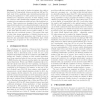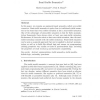53 search results - page 4 / 11 » Logic Programming with Defaults and Argumentation Theories |
IJAR
2008
13 years 7 months ago
2008
Possibilistic Defeasible Logic Programming (P-DeLP) is a logic programming language which combines features from argumentation theory and logic programming, incorporating the trea...
ECAI
2004
Springer
14 years 1 months ago
2004
Springer
In this work we further investigate the relation, first found by Truszczy´nski, between modal logic S4F and Default Logic (DL), analyzing some interesting properties and showing ...
COMMA
2006
13 years 9 months ago
2006
In this paper, we examine an argument-based semantics called semi-stable semantics. Semi-stable semantics is quite close to traditional stable semantics in the sense that every st...
KR
2004
Springer
14 years 29 days ago
2004
Springer
The causal logic from (Bochman 2003b) is shown to provide a natural logical basis for logic programming. More exactly, it is argued that any logic program can be seen as a causal ...
FSS
2008
13 years 7 months ago
2008
In the last decade defeasible argumentation frameworks have evolved to become a sound setting to formalize commonsense, qualitative reasoning. The logic programming paradigm has s...


